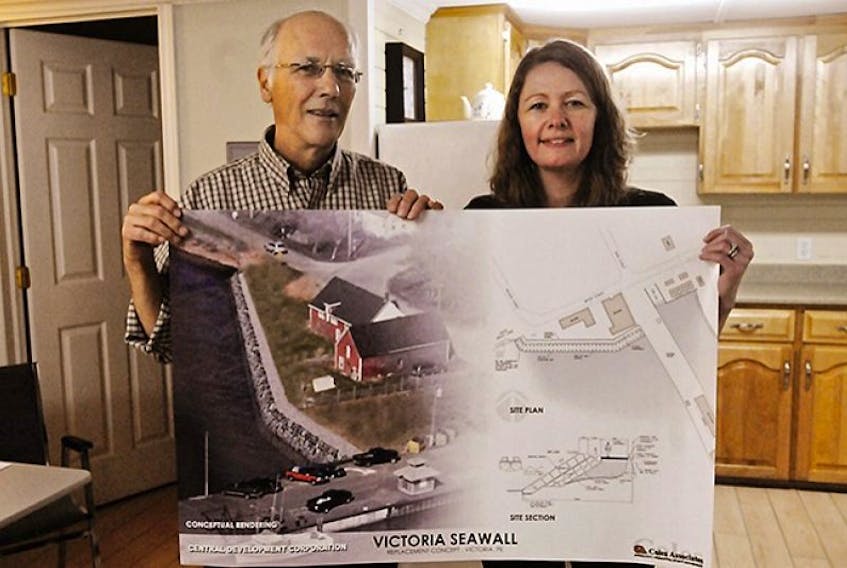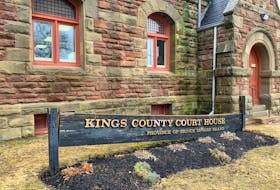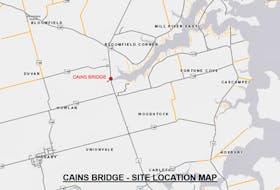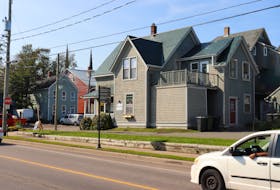VICTORIA – The small community of Victoria is finding itself trapped in an uncomfortable position of proposing a $1.1 million improvement project with hardly a drop of its own money to spend.
It held a community meeting recently in the famous Victoria Playhouse, in a basement room that serves as its office and only public meeting space. Eleven people attended.
Not far away is the old school house, in poor shape but owned by the town and a possible space to rent out for groups wanting to host weddings in the seaside town, or for community activities and events.
It needs about $83,000 to renovate to the barest of standards. The seawall in the town also needs urgent rebuilding to protect waterfront properties.
The costs are beyond the town, so it got in touch with P.E.I.'s Central Development Corporation, which is in just this business: finding funding.
The problems immediately became evident.
The main source of funding would be from the federal government, like the gas tax program, and the New Deal funding system. None of them allow for a basic renovation of a school house.
In order to meet all the complex interplay of funding restrictions and community needs, a grand, three-part project was developed.
The seawall improvement might qualify for federal gas tax funds, the school house might qualify for ACOA funding if it could be expanded to include an economic development component, including accessibility requirements.
A community park was also needed to meet certain funding needs.
The school house plan now goes far beyond a simple renovation, to become a $540,000 re-buiild. Now it will have an addition to the back, new heating and other changes.
It was a case of go big, or go home, the meeting was told.
"Basically because of the funding structure, because of the requirements, particularly from the gas tax fund, as well as the tourism criteria we had to meet for some of this funding, I don't think without actually putting in a new basement and including an addition, I don't think we would be getting the money in the first place," said Coun. James Clement. "It's an all or nothing kind of situation.
"There may have been some middle road that we could have gone at some point, but I was looking for it and I didn't see any opportunity," said Clement.
"It's about generating an income to put back into the community so that you have a space to call a community centre without putting your own municipal taxes into it," said Nicole Warren, executive director of the development corporation.
A question from the floor suggested the town abandon the whole idea and just sell the school house.
Even that is not so easy. It's located in a tightly regulated zone above the town's water well and comes with all kinds of covenants and restrictions, making it an unattractive property to buy, the council said.
The key message that council members kept presenting in different ways, was that the whole three-phase project that includes the seawall, the park and the school house re-build can combine for a mix of federal funding to make the town's share of tax dollars zero.
VICTORIA – The small community of Victoria is finding itself trapped in an uncomfortable position of proposing a $1.1 million improvement project with hardly a drop of its own money to spend.
It held a community meeting recently in the famous Victoria Playhouse, in a basement room that serves as its office and only public meeting space. Eleven people attended.
Not far away is the old school house, in poor shape but owned by the town and a possible space to rent out for groups wanting to host weddings in the seaside town, or for community activities and events.
It needs about $83,000 to renovate to the barest of standards. The seawall in the town also needs urgent rebuilding to protect waterfront properties.
The costs are beyond the town, so it got in touch with P.E.I.'s Central Development Corporation, which is in just this business: finding funding.
The problems immediately became evident.
The main source of funding would be from the federal government, like the gas tax program, and the New Deal funding system. None of them allow for a basic renovation of a school house.
In order to meet all the complex interplay of funding restrictions and community needs, a grand, three-part project was developed.
The seawall improvement might qualify for federal gas tax funds, the school house might qualify for ACOA funding if it could be expanded to include an economic development component, including accessibility requirements.
A community park was also needed to meet certain funding needs.
The school house plan now goes far beyond a simple renovation, to become a $540,000 re-buiild. Now it will have an addition to the back, new heating and other changes.
It was a case of go big, or go home, the meeting was told.
"Basically because of the funding structure, because of the requirements, particularly from the gas tax fund, as well as the tourism criteria we had to meet for some of this funding, I don't think without actually putting in a new basement and including an addition, I don't think we would be getting the money in the first place," said Coun. James Clement. "It's an all or nothing kind of situation.
"There may have been some middle road that we could have gone at some point, but I was looking for it and I didn't see any opportunity," said Clement.
"It's about generating an income to put back into the community so that you have a space to call a community centre without putting your own municipal taxes into it," said Nicole Warren, executive director of the development corporation.
A question from the floor suggested the town abandon the whole idea and just sell the school house.
Even that is not so easy. It's located in a tightly regulated zone above the town's water well and comes with all kinds of covenants and restrictions, making it an unattractive property to buy, the council said.
The key message that council members kept presenting in different ways, was that the whole three-phase project that includes the seawall, the park and the school house re-build can combine for a mix of federal funding to make the town's share of tax dollars zero.









